우팅야오(Wu Tingyao)

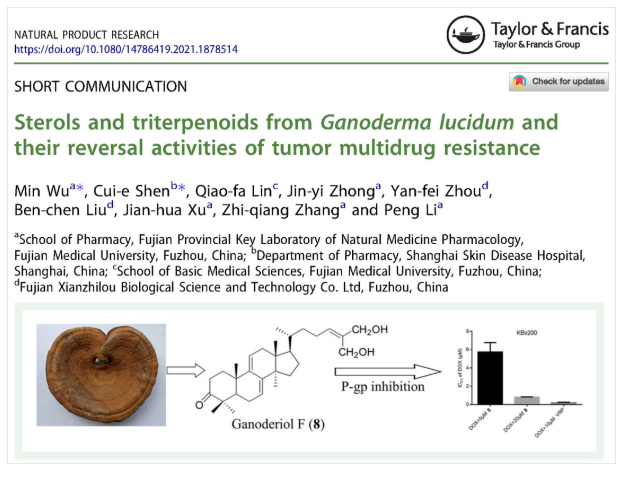
Cancer is difficult to treat because cancer cells develop drug resistance, meaning that drugs that would be originally effective in killing cancer have to be used at higher doses to be effective.
The problem is that chemotherapeutics will also kill normal cells, so it is impossible to pursue high doses without an upper limit in order to effectively kill cancer.
In this situation, patients usually have to replace drugs. For lucky patients, the cancer was controlled after they change drugs. 하지만, most patients do not have alternative cancer drugs. After the cancer cells are resistant to the original drugs, the patients can only resign themselves to their fate.
It is not easy to develop new drugs. 그러므로, how to reduce the resistance of cancer cells to existing drugs has become another way to survive.
In March of this year (2021), the research team of Professor Li Peng from the School of Pharmacy, Fujian Provincial Key Laboratory of Natural Medicine Pharmacology, Fujian Medical University published a report in “Natural Product Research” stating that a variety of triterpenoids in 영지버섯 have the activity of “reducing the drug resistance of cancer cells”.
Combining 영지버섯 triterpenoids with chemotherapy to weaken the drug resistance of cancer cells
The researchers used the fruiting bodies of 영지버섯 planted by Fujian Xianzhilou Biological Science and Technology Co., Ltd. as materials, first extracted them with ethanol, and then further analyzed the components in the extract. They found that there were at least 2 kinds of sterols and 7 kinds of triterpenoids (수치 1) in the extract.
Among these components, 6 kinds of 영지버섯 트리테르페노이드 (구성 요소 3, 4, 6, 7, 8, 9) can significantly improve the killing effect of traditional chemotherapy drug doxorubicin (DOX) on multidrug resistant oral cell carcinoma, 즉, lower doses of chemotherapeutics can be used to achieve the effect of killing half (50%) of multidrug resistant cancer cells (수치 2).
그 중, the combination of ganoderiol F (component 8) and doxorubicin has the best effect. 이때, only one-seventh of the dose of doxorubicin when used alone has the same effect (수치 2).
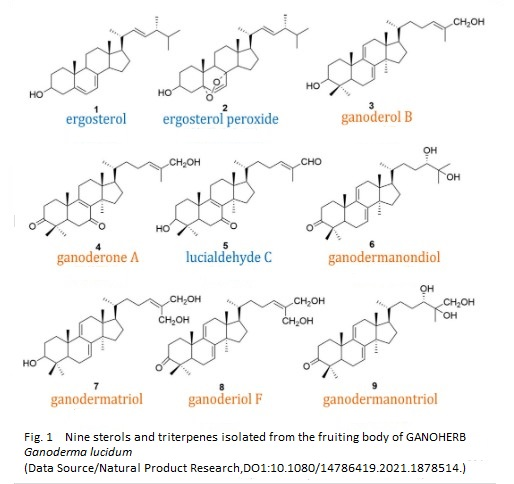
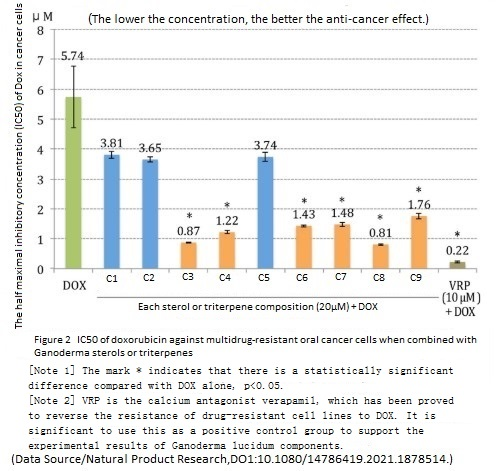
Normal doses of chemotherapeutics are difficult to kill cancer cells that have developed drug resistance.
How difficult is it to treat cancer cells when they develop multidrug resistance? You can learn superficially from Figure 3.
Adding 0.1μM doxorubicin to human oral cancer cells, ~ 후에 72 hours, the survival rate of general cancer cells is almost reduced to about half, but multidrug resistant cancer cells are almost unaffected (수치 3 orange dotted line).
From another perspective, in order to reduce human oral cancer cells to 50%, the dose of doxorubicin required to deal with multidrug-resistant cancer cells is almost 100 times the dose of doxorubicin used to deal with general cancer cells (수치 3 Green dotted line).
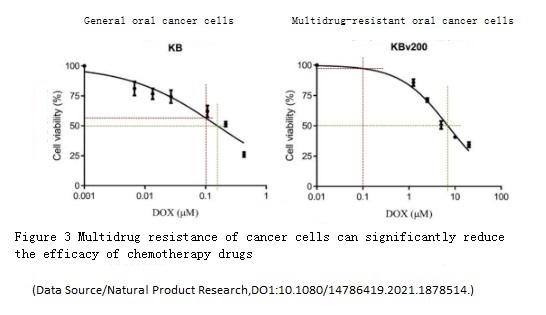
This result is derived from cell experiments conducted in vitro. It is impossible to do this when treating patients because it is impossible for us to sacrifice the normal cells that the body depends on to eliminate cancer cells.
그래서, what we can do is only let cancer cells grow at will? of course not. Because the research results presented in Figure 2 have told us that if chemotherapeutics and certain 영지버섯 triterpenoids can be used together, there is a chance to reverse the multidrug resistance developed by cancer cells to make the chemotherapy effective again.
왜 그럴 수 있지? 영지버섯 triterpenes weaken the resistance of cancer cells? According to the analysis of Professor Li Peng’s team, it is related to P-glycoprotein (P-gp) in cancer cells.
Cancer cells become drug-resistant by expelling chemotherapy drugs while 영지버섯triterpenoids can retain the chemotherapydrugs inside the cancer cells.
The P-glycoprotein, which is located in the cell membrane and straddles the inside and outside of the cell, is like a cell’s protection device, which “transports” substances that are harmful to cell survival to the outside of the cell, thereby protecting the cell from harm. 그러므로, 많은 암세포는 화학요법이 진행됨에 따라 더 많은 P-당단백질을 생산하게 됩니다., 약물이 세포 안에 머무르는 것을 어렵게 만듭니다..
그러므로, 우리 인상의 약물 저항성은 실제로 암세포가 스스로를 보호하는 방식입니다. 이것이 바로 약물을 끝까지 대체하면 암세포를 무장해제시키지 못할 뿐만 아니라 다약제 내성을 촉진시키는 이유입니다..
암세포, 물론, 자신의 생존을 위해 화학요법 약물을 경계해야 합니다.. 다행스럽게도, 영지버섯 트리테르페노이드는 암세포의 방어력을 파괴하는 방법을 가지고 있습니다.. Ganoderiol F에 대한 연구원의 분석, 약물 내성을 역전시키는 데 가장 좋은 효과가 있는 것, 가노데리올 F로 다제내성 인간 구강암 세포를 배양한 결과 (20 μM) ~을 위한 3 hours and then adding the chemotherapy drug doxorubicin can significantly increase the amount of doxorubicin accumulated in cancer cells.
재미있게, the number of P-glycoproteins in cancer cells was not reduced by the intervention of Ganoderiol F, so the researchers speculated that Ganoderiol F should weaken the “transport function” of these P-glycoproteins, allowing doxorubicin to remain in cancer cells and cause damage to cancer cells.
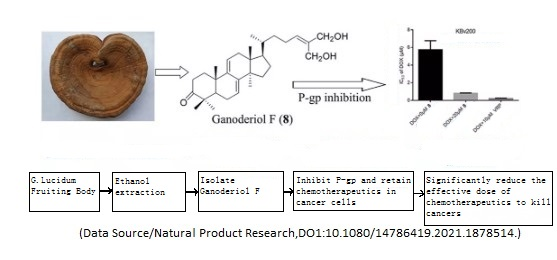
Without the alcohol extract of 영지버섯 to help out, there is undoubtedly a lack of many anti-cancer weapons.
Since the researchers only explored the mechanism of reversal of drug resistance by Ganoderiol and did not analyze other triterpenoids, they do not know how other triterpenoids make a highly drug-resistant human cancer cells become non-resistant to drugs?
Since this experiment discussed the triterpenoids and sterols separately, people can’t help but wonder if the joint use of them and chemotherapy drugs can make the effect better.
But at least this research tells us that the effective components of 영지버섯 which weaken the drug resistance of cancer cells are contained in the ethanol extracts of 영지버섯 자실체. The safety and effectiveness of the ethanol extract of 영지버섯 fruiting bodies have been universally acclaimed since it was used for various diseases in the 1970s.
그러므로, without the ethanol extract of 영지버섯, there will definitely be fewer anti-cancer weapons. If you don’t want cancer treatment to fall into the vicious circle of multidrug resistance, you may start by choosing the right 영지버섯!
[데이터 소스] Min Wu, 외. Sterols and triterpenoids from 영지버섯 and their reversal activities of tumor multidrug resistance. Nat Prod Res. 2021 3 월 10; 1-4. 도이: 10.1080/14786419.2021.1878514.
끝
저자 소개 / 씨. 우팅야오
Wu Tingyao가 직접 보고해 왔습니다. 영지버섯 정보
~부터 1999. 그녀는 다음의 저자입니다. Ganoderma로 치유 (4월 인민의학출판사에 게재 2017).
★ 이 글은 저자의 단독 승인 하에 게재되었습니다., and the ownership belongs to GANOHERB ★ The above works cannot be reproduced, GanoHerb의 허가 없이 발췌하거나 다른 방법으로 사용하는 경우 ★ 저작물이 사용 허가를 받은 경우, 승인 범위 내에서 사용해야 하며 출처를 표시해야 합니다.: GanoHerb ★ 위의 내용을 위반한 경우, GanoHerb will pursue its related legal responsibilities ★ The original text of this article was written in Chinese by Wu Tingyao and translated into English by Alfred Liu. 번역 내용에 차이가 있는 경우 (영어) 그리고 원본 (중국인), 원래 중국어가 우선합니다. 독자들이 궁금한 점이 있으면, 원작자에게 연락주세요, 양. 우팅야오.




